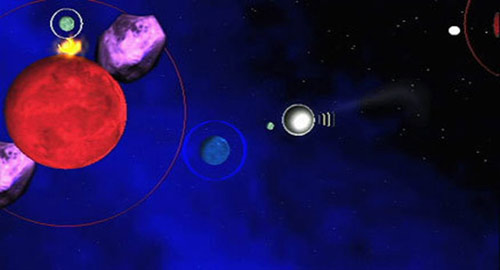I love puzzle games. I don’t mean that I love most puzzle games, but that I love the puzzle genre. This actually leads me to hate most puzzle games because of the unreasonably high expectations I set for them. But when I do find one that I like, I really like it. Orbient is one of those games.
The gameplay is simple. You are a planet wandering through a two dimensional universe filled with other planets. Most planets just follow their orbit patterns, but for some unexplained reason you have the ability to control gravity’s effect on you. There’s a button to activate regular gravity, and a button to activate anti-gravity. As you wander you’ll have to use these strategically to control your movement. Unlike most games, there are no buttons for moving an exact direction. The gravity physics are completely dependent on how large and far away your neighbors are. The game would be stupidly easy if you could just walk over to the goal, so this challenging mode of travel is what really makes the game.

The objective is to collide with your fellow planets and absorb their mass. Eventually you’ll attain a key mass and then be able to get your very own sun, which for some reason orbits you instead of the other way around. There are also other side objectives. You can try to get smaller planets to orbit you and there’s a crescent moon that appears along with the sun that is difficult to catch.
Orbient is about as related to actual astrophysics as Super Mario Galaxy. Things don’t work in any real logical way, they work in the way that’s most useful for the game. There’s nothing wrong with this type of design, in fact nearly any game that doesn’t explicitly try to be a simulator is like this. So I guess it doesn’t really make any sense at this point in time to criticize a game for not being realistic. But just like I did when originally playing Galaxy, I can’t help but point out to everyone that black holes don’t really look like purple balls and gravity, even if it had an on and off switch, doesn’t really work like that.
Orbient is a bit of an oddball compared to most of its peers. There has been extremely little promotion of it. The gaming community seems to only acknowledge it as a game worth buying if you own a Wii, and Nintendo hasn’t even made a big deal about it. This could be related to the fact that it’s a Wii port of a Game Boy Advance game, which is unusual. The game itself seems to try to separate itself from other games as well. If “indie” were less of an artificial genre I would call Orbient indie, but being a first party Nintendo title it doesn’t even belong there. But even compared to seemingly similar games, Orbient is still different.
It puts no effort at all into presentation and conventions such as story are absent. The only text in the entire game is in the menus and credits. The graphics are minimalistic and work didn’t even seem to be put into the background images. The soundtrack is just a few simple ambient tracks as well. Well, kind of. The only aspect of the game that uses a presentational technique is when you get a planet to orbit you an electronic beat is added to the soundtrack. The more planets you acquire the more beats get added. Eventually if you manage to get a moon the music changes to a soft lullaby. Aside from this there was virtually no apparent effort put into the presentation.
Orbient is not a rebel that ignores all conventions though. There are still scores, objectives, levels, unlockables, and lives (the lives are really used more as a health meter). Even though it’s unique, it’s clearly not trying to be unlike videogames. It’s trying to be pure gameplay without any distractions.

This only works to an extent. Presentation exists whether or not it was intended. The game doesn’t have no presentation, it just seems to have a very lazy one. The low resolution tiled backgrounds are like wallpaper in a cheap office building. Every planet looks like it was molded on an assembly line. Eventually it doesn’t look like it’s making a statement with its simplicity, it just looks cheap. The developers had the opportunity to incorporate simple subtle artwork and achieve the effect they were probably going for, but they missed that chance.
All of that being said, Orbient holds itself up very well. As easy as it is for me to complain about certain aspects, nearly everything about the game is extremely good. If this review sounds negative, it’s because it is so much harder to describe the good gameplay than the graphics. The criticisms against the art direction are massively offset by the great qualities everything else in Orbient. If anything, I think I prefer honest filler background images over the cheesy flamboyant ones in a game like Bejeweled. I’d also rather a game give me no context for it rather than a shallow not-so-deep metaphorical story.
The gameplay Orbient offers is a great experience that can’t be compared to any other game I’ve played. It’s the classic “easy to learn but hard to master.” The levels are fun and provide lots of opportunities to play with the physics. There’s always a single goal but never a “right” way to reach it. You’re encouraged to play with the environment and, as appropriate for a planet, to simply wander.
Orbient is very fun.

